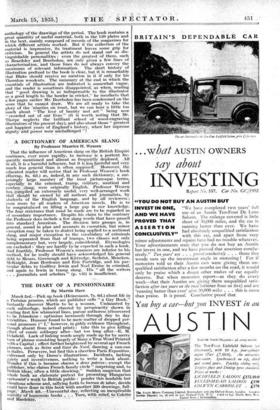A DICTIONARY OF AMERICAN SLANG By Professor Maurice H. WeSeen
That the influence of American slang on the British Empire continues, ever more rapidly, to increase is a portent fre- quently mentioned and almost as frequently deplored All in all it is a harmful influenee, but it is,lekii,,wrinful and very much less general than is often iuppoSeff. Moreover ; the educated reader will notice that in Professor .Weseen's book (Harrap, its. 6d.) as, indeed, in any such dictionary, a sur7 Prising.1Y large number of ' the most picturesque terms, especially in the criminal, tramp, Military, nautical and cowboy...slang, were Originally: English. Professor Weseen has Ennapiled an extremely 'mend, yery well arranged work that Aeuld be ,owned by all authors and journalists, by students Of the English language, and by all -reviewers ; even more by all readers of American novels. He is to be congratulated on filling a large gap in our knowledge. The four strictures' that must -he made are toi be regarded as of secondary importance. Despite. his claim to the contrary the Professor does include a few slang words that have passed hit° standard ,American. . The division into groups is, in general, Sound in plan and accurate in execution, but minor exception may be taken to dialect being applied to a Sectional slang, and major thteeption to the vocabulary of criminals being separated from that of tramps, two classes not only complementary but, very largely, coincidental. Etymologies are excluded : they are hardly to be expected in such a book. And fourthly, Professor Weseeri's manners are inferior to his method, for he really should have acknowledged his general debt to Messrs. Greenough and Kittredge, Sechrist, Mencken, McKnight, Jean Bordeaux and Eric Partridge, and his par- ticular debts to Godfrey Irwin and Noel Ersine in criminal, and again to Irwin in tramp slang. His "all the writers . . . journalists and scholars" (p. viii) is insufficient.










































 Previous page
Previous page